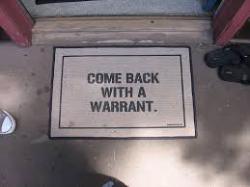In another victory for the Fourth Amendment, the South Carolina Supreme Court held that drug evidence discovered during a traffic stop was the result of an unlawful search which. was subject to the exclusionary rule. State v. Adams.
A defense to unlawful police searches – exclusionary rule
The exclusionary rule was created by judges as a remedy for fourth Amendment violations (unreasonable gov’t search & seizures) by law enforcement. The reasoning for this rule is to deter police misconduct. The courts recognize that suppression of evidence is a harsh sanction but it is the only means that will compel respect for the constitutional guaranty to safeguard the Fourth Amendment’s limits by removing the incentive to disregard it.
Exceptions to the exclusionary rule?
Courts have recognized several exceptions to the exclusionary rule.
- Good faith reliance – United States v. Leon, 468 U.S. 897 (1984)
- Inevitable discovery – Nix v. Williams, 467 U.S. 431 (1984)
- Independent source doctrine – United States v. Crews, 445 U.S. 463 (1980)
- Attenuation – Wong Sun v. United States, 371 U.S. 471 (1963)
What happened in this South Carolina Drug Trafficking Case?
Alfred Adams, was reported to be a drug dealer by a confidential informant (CI) to the North Charleston Police Department (NCPD). The CI claimed that Adams purchased drugs from Atlanta and New York. The NCPD placed a GPS device on Adams vehicle without a warrant. When the data from the GPS showed Adams vehicle went to Atlanta and was heading back to Charleston the NCPD conducted a traffic stop once he entered there jurisdiction. Police observed observed Adams commit a driving infraction but did not initiate a traffic stop. When he committed a second driving infraction the officer initiated a traffic stop. During the stop a drug dog alerted to the driver’s side door of Adam’s vehicle. During a pat down police recovered 141 grams of cocaine in a plastic baggy from his groin area (no drugs were located in the vehicle where the dog alerted). Adams was charged with trafficking cocaine a mandatory minimum sentence of 25 years based on the weight.
The issue before the South Carolina Supreme Court was whether there is an exception that will avoid the drugs from being suppressed.
Why the Court Suppressed the drug evidence
The defense argued for suppression of the drugs based on the fact that the GPS installation violated the fourth Amendment and South Carolina’s statute (See §17-30-140.) that requires police to obtain warrant PRIOR to installing a GPS.
Attenuation argument
Generally, evidence derived from an illegal search is deemed the fruit of the poisonous tree and is inadmissible. However, if the illegal search is somehow attenuated enough from the violation then the taint is deemed purged and the evidence is admissible. To determine if the evidence has been purged of the unlawful search the court looks at several factors, including:
- The amount of time between the illegal action and the acquisition of the evidence;
- The presence of intervening circumstances;
- The purpose and flagrancy of the official conduct.
United States v. Gaines, 668 F.3d 170 (4th Cir. 2012)(Citing Brown v. Illinois, 422 U.S. 590 (1975))
Under these facts, the traffic violations provided an insufficient attenuation from the taint of the illegal search because the traffic stop was entirely based on information obtained from the GPS and law enforcements desire to search the vehicle for drugs. Recognizing the dangers in authorizing such police action, the Court stated:
Endorsing this action would unwittingly provide a blueprint for circumventing the protections of the Fourth Amendment. Were we to sanction the intervening acts rule under these circumstances law enforcement would be free to install a GPS device on a suspect’s vehicle without a warrant, track them without impunity, and cure all ills from the underlying Fourth Amendment violation by awaiting for a fortuitous traffic offense. Such an affront to the Fourth Amendment would not serve the exclusionary rules stated purpose of deterring unlawful police misconduct.
Each of the three attenuation factors weighed against admission of the drug evidence, and the Court held that the traffic violations were not intervening criminal acts sufficient to dissipate the taint from the underlying fourth Amendment violation. The exclusionary rule was created specifically to deter this type of police misconduct regarding Search and seizure violations and absent an exception, the evidence is suppressed.
Good Faith Exception
The exclusionary rule does not apply when police act with an objectively reasonable “good faith belief” that their conduct is lawful. Davis v. United States (quoting United States v. Leon, 468 U.S. 897 (1984). Here the NCPD placed a GPS device on the suspect’s vehicle without a warrant in violation of the statute that had been in effect for six years. §17-30-140. The state acknowledged that the officers did not know about the warrant requirement but tried to justify the action because the officers “didn’t know they had to.” In response the Court strongly stated:
“There would be a fundamental unfairness in holding citizens to the traditional rule that ignorance of the law is no excuse, while holding those entrusted to enforce the law to be ignorant of it.”
The only binding law in this case was a statute that forbade police from installing a GPS without a warrant, there is no good-faith reliance exception to uphold a conviction or admissibility of the evidence.
Charleston criminal defense attorney
If you were arrested and police recovered evidence from a search call an experienced and trusted criminal defense attorney, SC at the Dale Savage Law Firm today for a free case evaluation at (843) 530-7813.

